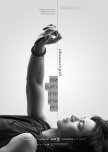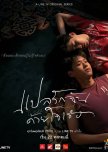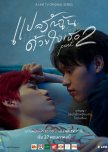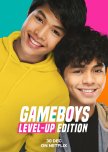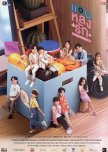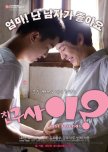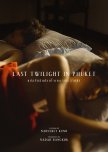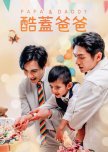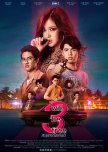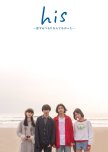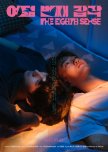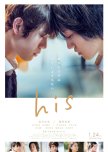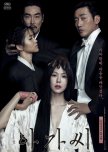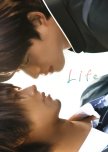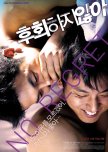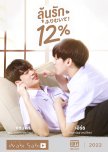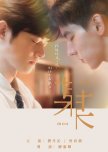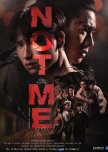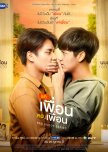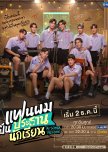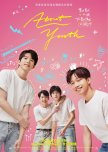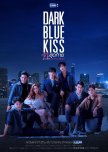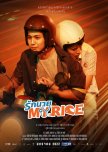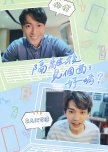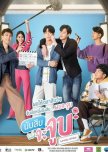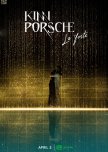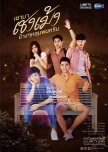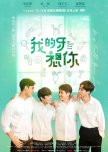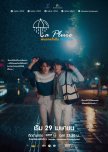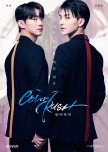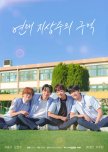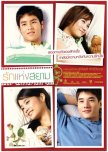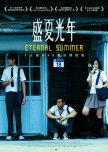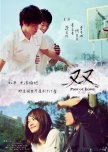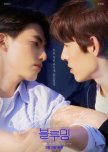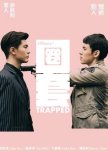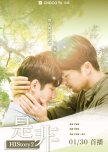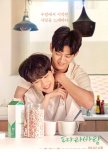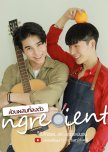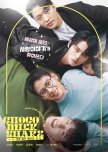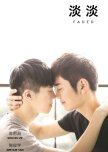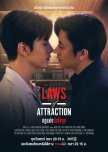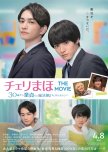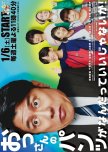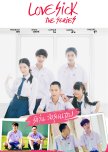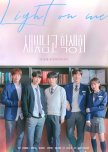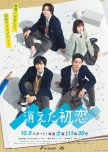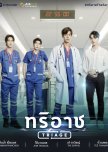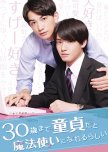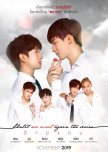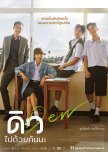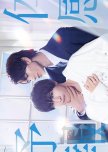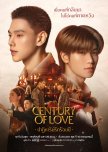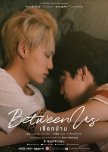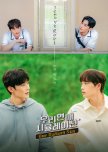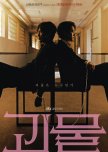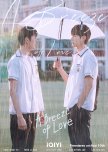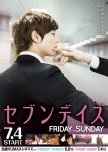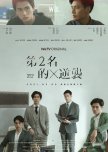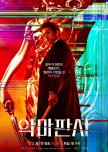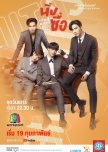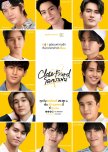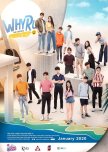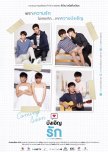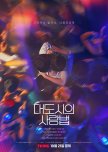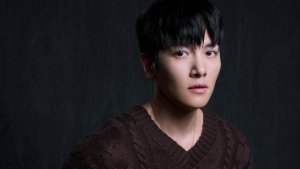Queer (or Queer-Adjacent) Shows
(Mostly) BL shows (and occasionally short films and movies) that I believe have genuinely queer content, whether that be via directorial lens, story, script, genre subversion, characterization, or just ✨vibes✨
Obviously, the ranking is highly subjective and not cut and dry. What is queer to me may not be to another person. Essentially, I am trying to put things on this list that don't feel like they're "commercialized gay" but rather are speaking to a true experience of living as a queer person.
-
1. 180 Degrees Longitude Between Us
Thai Drama - 2022, 8 episodes
Written and directed by prominent theater artist Tu Punnasak Sukee, this show feels as close to a filmed theater performance without seating a camera in the audience of a stage production. This is an intriguing entry into the BL canon. I can't entirely divorce it from the genre, nor can I ignore the ways in which it deviates and elevates certain tropes and conventions. Perhaps the first example I've seen of a truly "queer BL" which blends queer cinema and BL. Tu openly and confidently claims BL as the arena in which he's positioning this piece of work; it would be an insult to this show and the genre if anyone were to claim this as a piece of "truly queer" art. The style of this show (especially in its cinematography, set pieces and dialogue) unpacks queerness in an universally accessible, clearly illustrated way. It is just as obvious as any other Thai show in its messages but manages to evade cliche or hamfisted moralizing. Indeed, its nuance invites mutiple viewings. A show like this is startling to see in the sea of other BL. Though it does have a sad, somewhat bitter ending it does not get there by way of a well-trod queer archetypal narrative where everything is misery and nothing is hopeful. It is realistic, a warning, a plea, but with strength of conviction and lovingly rendered. A rare tragic queer story which does not leave me regretful for having watched.
-
2. I Told Sunset About You
Thai Drama - 2020, 5 episodes
Oh man this is realistic. So, so, SO honest to the queer experience. Sometimes it was a little too much to watch. Beautifully affirming but does not shy away from many of the difficulties queer people face in Thai society. No unnecessary homophobia for shock value. Their friends and family are supportive, but Oh-aew and Teh (especially the latter) still feel pressure to conform to heterosexual standards. This is done in a really nuanced way that I rarely see in television, unfortunately. Their respective love interests are also PHENOMENAL. One moment that stood out to me in the beginning was when Teh takes Oh’s crush on Bas COMPLETELY in stride and also shares his own crush on Tan with him AND tries to be his wingman and gossips with him about Bas…. My heart is full. Wow. Every single character matters and is fleshed out. This show is proof that you can write a heart-wrenching story that honestly deals with queer struggles AND has a happy, affirming ending.
-
3. I Told Sunset About You Part 2
Thai Drama - 2021, 5 episodes
Once again, this show continues to be queer. It takes on a complicated story, yet one we've ostensibly seen before in other BL and heterosexual dramas: moving away from home, attending college, trying to find time for your partner yet pursuing your own individual dreams and growth, cheating, etc. On paper it can seem as if the writers became lazy and fell on old tropes, but instead I believe it continues a theme of taking classic coming of age challenges to explore through a queer lens. None of what Teh and Oh-aew go through would have been nearly as interesting without the set-up in the first two installments or the queer angle to their tribulations. Oh-aew's struggles with strengthening his identity and finding what he wants is further complicated by the enforcement of others' expectations of his vis-a-vis his presentation (name, femininity, sexuality, etc.); Teh faces similar struggles but since he can blend into his surroundings in some ways easier than Oh-aew can, his take on a different shape and bring their own challenges. They are faced with decisions about public-facing personas that most non-queer people do not have to worry about. Friend circles echo different elements of queer community, with both serving as mirrors to the two in different contexts. The story isn't about Oh and Teh staying in the closet in college - they're both out - but rather with HOW they choose to navigate being out. Repression rears its ugly head more violently in Teh's case but does so in a wholly realistic way. Only writers with a more than surface-level understanding of and commitment to queer storytelling could craft a story which manages to tackle themes of the closet's impact without making the whole thing about coming out.
-
4. Gameboys Level-Up Edition
Filipino Drama - 2020, 13 episodes
Above all else, this feels AUTHENTIC to a queer experience. The specificity of the setting during the pandemic and how that affects the characters and their experiences of their queerness only enhance its genuine aura. Gav and Cairo feel like a real couple and their issues are grounded in reality. Multiple, non-demonized queer characters’ roles in their story demonstrate other queer experiences.
-
5. Stalker
Thai Drama - 2022, 14 episodes
Unbelievably queer. It's hard to wrap my head around how it's even possible for this show to exist within the genre of BL; this gives me hope for the future of the genre in Thailand and elsewhere, as well as for the future of Thai queer people. The conceit of the show as one that gives a platform for the "extra" characters typically made to be the butt of the joke in BL of the past places it squarely in the realm of queerness. These characters are femme, kathoey, gay, lesbian, bisexual... the community is well-represented. They're treated with compassion, care, and above-all are laughed WITH, not used as humor at the expense of the people they are. It might have helped that the director is queer as well. There’s tons of sex-positivity in here as well as representation of (TV-quality) safe sex. Linguistically, they sometimes use queer or queer-coded language, especially when it comes to the character Daisy. Their love interest, Touch, even queers his linguistics to flirt with Daisy. Though it can be PAINFUL to watch because of its amount of cringe, the humor lends itself to a camp element that only makes it that much more queer. I could write an essay on all the ways this show is truly queer and revolutionary in the genre.
-
6. Just Friends?
Korean Movie - 2009
Legitimately an important piece of Korean queer cinema!
-
7. Last Twilight in Phuket
Thai Special - 2021, 1 episode
It may just be a special episode, but the beauty of this relationship and relationship with the previous season of the show bumped it up to this spot. The two are intimate, never shying away from casual affection in the way that is unfortunately the norm in other shows. They’ve clearly had a strong relationship prior to the film’s events which makes their impending separation that much more sad. These characters just feel so queer to me, as did the story of this short: finding a day of peace before the world imposes its responsibilities, revisiting places that mean so much only to find yourself unable to access the same privacy vital to your queer coming of age, finding comfort in the arms of your loved one but feeling a simultaneous grief. Still loving each other despite the brevity of your time together. Maintaining hope for the future.
-
8. Papa & Daddy
Taiwanese Drama - 2021, 6 episodes
SO affirming, SO queer. Co-parenting, chosen family, coming out, gay domesticity, MULTIPLE LESBIANS, same-sex marriage, real footage from 2020 Taipei Pride, and so much more is in here. I felt so warm and happy watching this.
-
9. 3 Will Be Free
Thai Drama - 2019, 10 episodes
ONLY a queer show could write/portray legitimate polyamory, especially between the three main characters. And the polyamory is GOOD. One of the mains is a gay man, and his relationship with the woman in the triad is handled with adroitness I have not seen in any other show. His insecurity (as he is new to relationships in general and has been rejected badly in the past) is addressed and gentled with sincerity. Another one of the mains is an OPENLY bisexual and polyamorous man. Outside of the triad, the gay character (Shin) also enters into a romantic relationship with another man, which is not treated with any suspicion. Outside of the polycule, this show features a major trans woman side character; her story centers her transness beautifully and non-stereotypically, and is all about her self-actualization. Her ending is rather bittersweet, but is marked with her taking back her power. She is shown to be in a long-term relationship with a man, with another man later showing genuine interest in her. Kathoey characters have major (side) roles in the beginning of the show, though one does die in a way unfortunately reminiscent of the reality of queer death IRL. Ultimately, as this is directed and co-written by (at least one) gay man, the queer lens is ever-present and the story deftly balances queer realities with affirmation. Themes of queer identity, morality, life choices based on repression and/or acceptance, grief that results from love, boundaries of friendship and romance, bodily autonomy, freedom, and communication.
-
10. His - Koi Suru Tsumori Nante Nakatta
Japanese Drama - 2019, 5 episodes
A beautiful, honestly realized story of gay adolescence. Without being exploitative, His - I Didn’t Think I Would Fall In Love gives us a visceral snapshot of an incredibly personal experience. The script is exquisite; it would probably take multiple watches to fully plumb the depths of every metaphor, every autobiographical moment, every parable it manages to place within five short episodes. It may not be rare to get pieces of queer semi-autobiographical storytelling anymore, but it certainly is rare to see one that manages to balance bitter realism with lighthearted hope as well as this. Further proof that realism does not have to be violent or voyeuristic.
The women and girls in this are incredibly well-written as well. They stand as both positive representations of heterosexuality (one being the wife to the man Nagisa sees as a proto-father figure) and as representations of its pressures. All are fully-fleshed out characters, not there at the expense of gay male angst or as mere plot devices. Even Nagisa’s ex, the one perhaps a little more thinly portrayed, is not exempt from compassion on the part of the show or its characters. Girls are simultaneously representations of freedom and suppression.
I would genuinely love to read and annotate this script. There’s so much more to sink my fingers into. Ultimately, this show intimately understands its subject matter and treats it with the love it deserves. Every character feels like a real person. I probably partially feel this way since this takes place in 2006, which was the year I became a preteen. I know these people.
-
11. The Eighth Sense
Korean Drama - 2023, 10 episodes
Still slightly exists within the "KBL bubble" but this show does quite a bit to ground itself in a real world. Jae Won and Ji Hyun are both conscious of their sexuality and where it places them in their environment, but the story is not concerned with that specific tale of self-discovery. It utilizes environmental and internal anxieties still very recognizable to queer viewers but ultimately universal: feelings of displacement, finding community in the city, alienation among old friends, compulsory heterosexuality, filial piety, trauma, grief and loss, and the liberation of that first queer love. Both characters feel fully-realized as young queer men discovering who they are and what they want.
Its cinematography, score and editing clearly evokes that of old guard queer films and television which have since become iconic in their own right (SKAM is one clear major influence). Directors Werner du Plessis and Inu Baek have both made it clear that they do not consider this show to be a BL, but it absolutely knowingly draws on many tropes and conventions. I believe their insistence comes from a desire to cater directly to a queer audience and distance themselves from a genre that has largely catered itself to a hetero woman audience. While this is a respectable goal, I think this perspective somewhat misses both the transformative potential of BL and some of the limitations of certain conventions of what they consider to be "queer cinema." It's definitely an interesting piece of art to look at as a unique blend of Western (German) and Eastern (Korean) perspectives. It successfully merges the two while still very much carrying flaws of both traditions. I would be fascinated to see where Korean queer art goes from here, both in BL and from the community itself. There's a lot to learn from this show.
Not a fan of that weird Hedwig drag part. Pretty confusing. Editing or translation issue, hopefully?
-
12. His
Japanese Movie - 2020
Affirming as fuck! Another example of how you can accurately portray homophobia, even pit your characters against it during the course of the narrative, and ultimately assure the audience of their continued happiness. This is an incredibly nuanced and well-done portrait of blended and found family. Nagisa’s wife is not treated like she’s the mother of the year, yet the script and narrative show her compassion for the way she was treated as Nagisa was grieving his relationship with Shun and battling his internalized homophobia. Though I do wish she wasn’t given full custody, I understand the strength of that narrative and character choice. This film not only affirms gay parents as being a perfectly functional and happy family structure, but directly points out how strict scriptures of caregiving can do more harm than good to a child. Beyond that, the way they handle both Nagisa and Shun’s internalized homophobia is fantastic. I’m especially impressed with the flashback they showed of Shun facing homophobia at a work event; this ties nicely into the many cases where they both have to casually deny who they are. His doesn’t shy away from the consequences of that self-denial, either. There are so many other ways this film is wonderfully ground-breaking, but it would take ages to elucidate everything. You simply have to watch it.
-
13. Mademoiselle
Korean Movie - 2016
This is a film which both is very queer in terms of its script (narrative, setting, characterization) but loses a sense of queerness based on its male director's visual choices.
Based on a queer book written by a queer woman, the story follows a poor Korean woman who infiltrates a rich Japanese woman's (played by a Korean actress) home by posing as her handmaiden. Lady Hideko's life has been consumed by misogynistic, predatory behavior of the men around her, especially her husband. Sook-hee also suffers under patriarchy, albeit in less-sexually exploitative ways. The story tells of the women's sexual, psychological and physical liberation from heteropatriarchy, with the setting of Korea under Japanese colonial rule further highlighting its themes of righteous rebellion and liberation from oppressive forces.
Director Park Chan-wook does beautiful work here, but there are decidedly male-gazey elements to how he uses the camera and even in how he punishes the male characters. It could be argued this is purposeful, but I hesitate to uncritically give so much credit to a project still largely guided by men. I also don't think using the male-gaze in this way as a meta-commentary really works in this context. Ultimately, he did not create this film for lesbians. Here is a great video by YouTuber verilybitchie, going into the concept of the male vs lesbian gaze using this film as an example.
-
14. Life Senjou no Bokura: Director's Cut
Japanese Movie - 2020
Felt true to my personal queer experience. Related to Akira a little too much for someone who hasn't even been in a relationship. This movie explores internalized homophobia and the pressures of compulsory heterosexuality very, very well. Akira's actor, in particular, did a wonderful job of embodying the kind of character Akira is. I never felt like his motivations were unrealistic or plot devices. Yuuki's character was also quite well-done, as another look at how comphet can affect a person, externally and internally. Loved the ending as a gratifying (if cheesy) subversion of typical gay narratives; yes, the two are together, despite everything, despite time, despite (natural) death.
-
15. Wedding Plan
Thai Drama - 2023, 7 episodes
Queer friends and family in this show are vital to the world of these characters. The fact that Nuea's office gays get to plan the "wedding" in the special (not legally binding) is powerful.
Nuea is femme, but not stereotypically flamboyant. He is fully sexually agentic. He speaks his mind and stands up for himself. He is competent, passionate, and sets boundaries.
Yiwa and Marine are fully committed to each other, in a relationship which has lasted for decades in the closet. Marine speaks openly about how this has taken a toll on her but feels being with Yiwa is worth it. They deal with the constant threat of being outed, scrutinized by Yiwa's mother and friends. Marine is confronted by Yiwa's mother which leads to Yiwa running away with Marine to the UK and marrying her. It's a bittersweet ending for them.
Lom's experience of the closet and how he behaves was the most relatable part of this show. He's known he was gay from a young age and hides because of expectations of his parents. He approaches Nuea under false pretenses but spends the rest of the show unwrapping his sincerity and figuring out how he can show that while still protecting Yiwa. He is one of the best examples of how the closet can affect us I've ever seen in BL or any queer show. I am very disappointed that his character has been misunderstood.
By far the queerest part of this show is the relationship between Lom and Yiwa, best friends since childhood. Lom and Yiwa see two women kissing while on a trip to the UK as young teens and have to listen to their mothers' disgust at the display. Everything they do is to protect each other; their relationship form the crux of this show. Lom spends the entirety of this show choosing to jeopardize his relationship with Nuea just so he can carry out Yiwa's plan of a lavender marriage. It takes Yiwa, seeing the impact of her choice on Lom and the futility of the endeavor, to put an end to the plan.
-
16. No Regret
Korean Movie - 2006
Considered by many to be the first “real” Korean gay feature film (and the first to be directed by an openly gay South Korean), this is important to the history of queer cinema in the country. The way it’s directed and acted, as well as its function as a larger metaphor about the intermingling and clash of upper and lower classes, injects it with a queerness that persists despite its occasionally bewildering story. Not sure if I can say this is queer affirming, but it definitely is an interesting presentation of the queer experience. The respective characters’ experience of their sexuality as mediated by their class gave this film its best moments. Pressures of heteronormative Korean society were imposed and felt differently, as was their attraction to each other. Whether watched as a character piece or as a sort of allegory of gay class consciousness, there’s a lot to think about here.
-
17. My Only 12%
Thai Drama - 2022, 14 episodes
Created by New Siwaj, a queer director who always has a clear queer vision even if the show itself is muddled. This is probably his clearest project yet in terms of the queer themes extrapolated upon. This is a story of queer coming-of-age from two different perspectives. The most relatable and touching queer narrative (for me) comes from Seeiw, who knows he's different from a young age but does not put his finger on the source until he watches "Love of Siam" and is promptly devastated by its amorphous ending. His arc following his realization might be the most realistic I've seen in BL. On the other hand, Cake is not entirely ignorant of his feelings for Seeiw from a certain point but does not come into his feelings until they're both in college. What I really enjoy about this queer story is that we see Seeiw transform from an insecure, shy gay kid to a more confident gay adult with full awareness of his queerness and what it means for him (in all the good and bad), while Cake mirrors that transformation and must find his own footing and how to be in a relationship with someone in a way which doesn't sacrifice growth or self-actualization. New isn't entirely able to satisfactorily close all the loops with relation to family/friend dynamics in this but it is an admirable effort, and potentially the most true-to-life BL yet.
-
18. The On1y One
Taiwanese Drama - 2024, 12 episodes
Specificity of emotion and atmosphere are what resonate with me most as a queer viewer. This show has both in spades. Directed by the queer man who did "Your Name Engraved Herein", it only misses being one of my favorite shows because of questionable production and writing choices concerning its pacing and some side characters. I desperately hope this gets a second season, but my hopes are not high.
On the note of those side characters: I understand why the writers may have chosen to create a different narrative of sorts for the teachers, but with that and the weird insertion of Jenny into their relationship I think they missed an opportunity to give Sheng Wang and Jiang Tian older queer mentors as was canon in the book. That choice feels like a calculated move on the part of production rather than a well-thought out choice. I believe this queer narrative specifically would have been better keeping that aspect of the original story.
Otherwise, the reason this show resonated with me so deeply is in part due to other changes they made, namely with changing the time period to 2012 instead of the original 2019. This brought the show closely in line with my own high school experiences. I loved that they took these characters' dedication to schoolwork so seriously, as much as they did other sources of angst. Their respective family histories and struggles with feelings of loneliness hit me deeply, especially Jiang Tian's approach to... everything. I also found myself resonating quite a bit with how Sheng Wang realized and processed his queer feelings. I recognize that this show's utilitzation of the step-brother trope may turn many people off, but I strongly believe it enhances the show's themes. As it stands, this story is incomplete. However, it is still a powerful queer narrative of what it is to fall in love for the first time as a young queer man.
-
19. Not Me
Thai Drama - 2021, 14 episodes
It’s so interesting to watch this show knowing the history of GMMTV and past BL-type shows when it comes to their portrayal of queerness. We really have come a long way and this still exists in an industry that continues to use stereotypical and queerphobic narratives and characters. I’m impressed with how progressive Not Me's politics are even if they became a little heavy-handed and not as radical as they purport to be.
This show tries to be inclusive and as queer as possible. It’s subversive without being entirely radical. I’m not used to subtlety or deftness from either GMMTV or Thai BL in general so the casual queer representation is honestly something I had to get used to. Nuch especially is WONDERFUL. Especially in a show about activism, it’s very important that they had an intelligent trans woman in a leadership role. Truly the most subversive moments (especially considering this show’s relationship to BL) are when Gram and Nuch interact - Nuch is not a stereotype of a trans woman, is treated seriously, and was once Gram’s girlfriend. They consistently mention their past romance and casually (platonically) flirt and banter.
Off and Gun grabbing hands under a gay pride flag?? So majorly symbolic for how far Thailand and BL have come. DanYok’s relationship feels INCREDIBLY queer, especially linguistically. SeanWhite also have an authentic-feeling queer relationship. This might be my favorite representation of chosen family in a BL (adjacent) show.
This is directed by an award-winning trans woman who has directed queer films in the past, which certainly plays into the show's queer lens. Also based on a fanfic by a trans woman. GOD BLESS Nuchie for making this show so queer. The rapport between romantic pairs and sex scenes feel INTIMATE!!!! The way she films nudity doesn’t feel voyeuristic at all which is an almost anomaly in BL. The show even has CASUAL romantic intimacy?!
-
20. Long Time No See
Korean Drama - 2017, 5 episodes
On its surface, this would not appear to be an obviously queer show. It’s only once watching the whole thing does the queerness inherent in the story really start to sink in. The story begins with violent homophobia, with our main character trying and failing to keep a grip on his dignity and being “rescued” by an abusive parental figure; the story ends with him saving his boyfriend after he was beat up in an attack at least in part incited by homophobia - at the command of his father - and asserting the dignity he had struggled for the entire story to reclaim. They then leave arm in arm, bloodied, exhausted, but alive and in love. The power of that message cannot be underestimated. This show is incredibly subtle in its queer messaging which honestly makes it hit home more for any queer watcher. Other themes include: chosen family, bullying, pride in one’s identity, overcoming trauma, forging emotional intimacy in the face of said trauma, oppressive family systems, etc. There’s also a wonderful scene where Chisoo’s boyfriend takes him to a gay bar in a gay corner of South Korea, for what is clearly his first time. Another element of Chisoo’s character I thought to be wonderfully queer was how he wrote mlm stories online.
-
21. Bad Buddy
Thai Drama - 2021, 12 episodes
Fantastically sly queer lens. Subtle, but absolutely there. Queerness largely lies in its direction and genre subversion. A massive theme of navigating, reconciling with, and creating family enables P'Aof to deliver other queer messages in what could easily fly under the radar as simply an exceptional BL. Only major misstep is in the way the outing of Pran and Pat by Pran's best friend is handled. Wai is perhaps much too easily and quickly forgiven for what is a massive betrayal. However, his later total acceptance of his crush Pa's interest in Ink (and thus complete acknowledgement of the validity of sapphic relationships and attraction) was possibly the only way he could've ever been satisfactorily redeemed; I still wish more was done but it was great to see.
-
22. My School President
Thai Drama - 2022, 12 episodes
Quietly subversive, this show does not try to evade its BL trappings. Rather, it proudly leans into what it is. Directed and screenwritten by queer men; it's clear to see their intentions of authenticity and cementing progressive change in the landscape of Thai BL. Tinn's attraction to Gun especially feels sweetly joyful in a way which felt true to the people making the show. It really felt like everyone was aware of their audience (both the wider cishet audience and the queers watching) and aimed to create a story which normalized and brought new dimensions to perspectives which may have felt well-trod to those not living queer lives. Parental relationships were one place where they especially excelled; I am loath to think of any other BL that showcases different reactions to queerness without leaning into easy "foil" paradigms of one accepting parental unit vs. a homophobic unit (which may or may not come around in the end). A beautiful show in and of itself, but also gives me hope for Thai queer youth.
-
23. Old Fashion Cupcake
Japanese Drama - 2022, 5 episodes
I could truly write for ages on all the ways this is one of the best queer pieces of art I've seen. A complex and rarely-seen look at coming of age in middle age. Coming into queerness at a later age is an element of the LGBT experience that is not talked about nearly enough.
It's difficult to explain exactly why I feel like this doesn't have a queer lens, per se, yet also believe that every single choice production made - directorial style, camera work, cinematography, set blocking, etc. - supported and fleshed out the queerness in the story and characters. The performances are also great; it really feels like both actors spent time getting to know their characters' motivations and approach them with no judgement. The majority of this show's queerness, to me, lies in its screenplay.
Food as an allegory for intimacy and metaphor for desire is a beloved stomping ground in Japan, and they utilize it extremely well here. For Nozue, food is how he revitalizes himself, how he reconnects with feelings of desire he had let stagnate in apathy, how he rediscovers his youthfulness. Togawa gives him this gift and relishes in the opportunity to give Nozue everything he hungers for. Togawa is an incredibly relatable character for those of us queers of a similar age; his confession to Nozue is a beautiful and heartbreaking expression of love and fear of rejection that feels very, very true to life. Nozue's resignation to living his bog standard life with no chance to grow his happiness also feels incredibly real.
This show manages to explore topics like internalized homophobia, queer apathy, the inherent fear in a confession to someone of the same sex, repression, heteronormativity, normative scriptures of masculinity, shame, self-discovery, and emotional freedom/queer joy (and so on), all in extremely satisfying and deeply felt ways.
-
24. I Secretly Fell in Love with the Student Council President
Taiwanese Drama - 2022, 8 episodes
Sweet and genuine in its queerness. Feels like a peek into the lives of queer kids, in a bubble, perhaps, or just on the outskirts of our true society. The attraction the leads have is imbued with a giggly sweetness not often allowed of gay boys (at least, not without repercussions). They’re so gay, sans stereotype, repression or threat of tragedy. The show ends in the most affirming way, with a sweet kiss between the two leads that both admit is their first. A rainbow spans the sky behind them, an open affirmation of who these boys are.
It’s in the side character, Ray, that we see the full extent of how queer this show is willing to go. It’s unclear what his gender identity is and so what his motivations are for cross-dressing, but Ray starts out the show doing so and is not judged for it. It’s possible he may have cross-dressed to please the guy he was initially seeing, but that is just speculation on my part as he does not cross-dress again after their relationship ends. Either way, his queerness is not suppressed but is instead embraced by his friends and his final love interest.
The friendships in this show are also wonderfully queer and affirming, especially the relationship between RayRay and Ye Guang. They talk about their relationships and support each other fully, in a way that feels completely true to an IRL queer friendship.
-
25. GAP
Thai Drama - 2022, 12 episodes
First major, full-length GL out of any country. Took great care in ensuring sex scenes were not gratuitous. Feels like it was written by a woman attracted to women.
Has a side butch and (possibly?) trans character (Tee and Kade)! Both are considered important by the narrative and have a solid amount of screentime. Yuki, Mon's best friend, is bi and in a relationship with Tee (crumbs). Has a khatoey side character (Mee) who is comic relief but not at the expense of their gender, at least not as far as I can tell. Still treated with kindness, not disgust.
Manages to feel very sapphic despite its weak plot and writing and many, many PSA breaks. Feels like a labor of love by all with much effort to do something positive and effect change. Sometimes felt like they were going down a checklist and had a hard time balancing their desire to be LGBTQ-friendly and craft a functional plot and story. Lots of references to lesbian in-jokes and conversations with queer/ally friends/family and queer role models in the community such as Cher and Risa, who are "married."
Sam's older sister, Song, has a tragic story. Though it’s definitely corny, it is still heartbreaking and important that they show the importance of Song being an older lesbian role model, who came out and was rejected. It’s clear that seeing her sister with her girlfriend was a hopeful experience for her, which made the blow land harder.
Sam and Mon's first kiss scene was incredibly sapphic. The playfulness, the obfuscation of it as a game, the asking if women do it to their women friends and saying “yes this is normal,” the squishing and feeling each other’s faces...
How queer this feels was a bit undercut by the source material and production issues, but the effort was there and keenly felt. Successful as a story or not, this is a landmark moment in GL and wider representation of LGBTQ+ people in Thai and worldwide TV. -
26. Dark Blue Kiss
Thai Drama - 2019, 12 episodes
I was genuinely surprised with how gay this show is. P’Aof’s direction has an undeniably queer lens. It has themes of coming out, the closet, self-acceptance, socioeconomic influence on the queer experience, found and chosen family, and internalized homophobia. They also allude to safe sex and talk about sex in a non-fetishistic way!! Loved the characters and how they all represented different aspects of the gay experience: Non, the self-hating queer kid with a homophobic father who then weaponizes that homophobia to hurt others and try to carve out a place for himself where he has control; Pete, who has already worked through his feelings about being bi and now must work through his pre-existing insecurities with the added pressure of the closet and desire to make his father proud; Mork, who has led a tumultuous life and now is faced with the potential of comfort and security with a man and must learn to trust when he’s so used to protecting himself; Kitty, Sun’s ex-girlfriend, who helped Sun admit he wasn’t into women and then took the opportunity to explore her own sexuality; Sun, an authentic-feeling gay man, who constantly works to prove himself in the eyes of the world and a father who believes being gay holds him back from success; Kao, who feels he must stay in the closet to protect his family yet knows it’s hurting his partner, who cannot let himself be who he truly is and must realize that holding himself back hurts the people he was trying to help. Pete and Kao’s parents both are great examples of accepting parents who support their kids in their respective journeys differently by virtue of their coming outs being different (they’re essentially both outed, regardless). There’s so much more important gay advocacy happening in this script and narrative that I can’t fit into this blurb. Ultimately, I’m very impressed by how much they were able to satisfactorily cover and explore in this show.
-
27. My Ride The Series
Thai Drama - 2022, 10 episodes
My Ride's queerness lies in its script and characters. Uncles Cheep and Dej are FANTASTIC. Not only are they great characters on their own, they are two older bi men in a long term relationship, there as representation for viewers and for Mork, who goes to them for advice and has moments of self-recognition as he works through his own bisexuality. They also act as important figures in Tawan's life. They are shown to be trusted caregivers, their place in the community implied to be an important one.
Mork is a poor, working-class man from southern Thailand. He's a surrogate father to his brother's son. He has active discussions of what it means to fall in love with a person of the same gender after dating a girl previously. There's a lack of any real seme/uke dynamic with Tawan; they are equal in their care for each other. Mork's friends and family are supportive and important figures in his coming to terms with who he is.
Tawan is out and comfortable in his sexuality. His best friend, family and coworkers are supportive. He is given complexity in his relationships with other queer men, which is not something we see too often.
Por is not entirely demonized by the script. He is shown to be somewhat remorseful and is not painted entirely as a predatory gay character. Top is actually somewhat complex, even as the "other man". He is given agency.
There are multiple side queer characters; one femme character at the beginning is slightly demeaned and stereotyped, and the trans woman gets maybe one minor line and is not an active participant in the discussion of her identity, but nobody is outwardly made fun of. Fueang's attraction to Ms. Ai comes with some confusion played off as comedic and some questionable conclusions drawn about her gender but ultimately is used as a moment for Mork to affirm queerness (others' and his own) and the two agree that gender does not matter if you are attracted to someone.
-
28. See You After Quarantine?
Taiwanese Drama - 2021, 10 episodes
Quarantine projects like this automatically feel more queer than not by nature of their workmanlike approach and aesthetic. This show just also happened to have a wonderful queer friend group who commiserate about their queerness multiple times, another accepting friend group, light jabs at (and teasing inclusion of) BL tropes, and even an in-joke about BL in the form of an academic paper tackling the tanbi subculture. Sato’s concerns about pursuing Bo Chun are rooted in realistic fears, and his anxiety about making his sexuality known is handled in a very gentle and queer fashion. Not everything about being queeris horrific - our anxieties may often be because of our queerness but aren’t always earth-shattering. The scene where he clearly coordinated with Chi Dong to “out” him was SO realistic it made me laugh.
-
29. Lovely Writer
Thai Drama - 2021, 12 episodes
The queerness is palpable in this show, not only in its script and story but in its characters and their relationships. It's queerness comes from self-reflection on the BL industry rather than an honest or authentic queer story, but it feels organic to this narrative. Especially thrilled with Tiffy and Tum - their relationship is delightfully queer beyond even just Tiffy’s sexual orientation; especially astonishing considering its genre. I do wish Tiffy’s queerness had been more a part of her character, but I’m happy with what can be read into her story and reactions to Tum’s advances. Where Lovely Writer fell short was in its discussion of anal sex - the idea that it must (always) hurt, no discussion about lube/condoms or safe prep, and the idea that bottoming equates to “doing something for the other person” are all BL tropes recycled and pushed by straight women. The coming out scene in episode 9 is the best coming out scene I’ve seen in BL (nearly - BLIH: I Do tops it because of its positivity and less manipulative sound editing and score). It’s certainly the best written and directed one. Every single person at the table exhibited different, completely authentic reactions and flavors of homophobia. Having supportive (unique in their own ways; one more in-tune with the situation and one more awkward) older brothers was a great touch. Having the dad’s queerness revealed gave amazing layers to that scene as well. All the subsequent conversations related to the coming out - when Gene confronts his dad, the brothers commiserate over how to best support their siblings, Nubsib’s family accepts him, Gene and his mother make tea, and especially when Gene and his dad have their heart-to-heart - are all very well done. The way the show handles Gene’s dad and his relationship to queerness is especially beautiful. Aoey is also an interesting character, authentically gay in a way I haven’t seen in any other BL.
-
30. KinnPorsche
Thai Drama - 2022, 14 episodes
A gloriously queer mess. To be clear, the show's queerness does not lie in the plot, which is largely nonsensical. The scenes in Yok’s bar are a revelation, as is Vegas and Pete’s conversation after they have sex. The way they handle Porsche’s sexuality is done quite well, too.
-
31. Some More
Korean Movie - 2018
Made by Strongberry, South Korea’s preeminent studio for queer BL/GL. Directed by the same man who did Long Time No See (Kangwoo). The setting of a farm always makes a gay story feel more queer just by virtue of the location outside watchful eyes. The main characters recognize each other as gay, and when Dongsu finds some stuff in a box Inpyo has hidden away, he instantly recognizes their significance; in turn, Inpyo knows Dongsu is familiar with what he saw. This covert, almost subtextual recognition and communication is VERY queer.
-
32. He's Coming To Me
Thai Drama - 2019, 8 episodes
Not exactly queer lens but the gay director/screenwriter inserted a lot of subtle queer flags in the story! Really like the way they introduced and discussed Thun’s sexuality. It feels natural. The concerns he expresses about comphet and his friends potentially clocking him felt VERY realistic. The ghost story ended up being a really effective metaphor for the grief, isolation, loneliness, inability to communicate love/understand your own feelings, desire for connection, etc. that often come wrapped up in queerness. The queer metaphors/allegories are LAYERED throughout this show. One of my favorite coming out sequences in a BL, too! Ultimately, I found this to be a really effective allegory for the queer experience. Loved that it ended a happily - quite a nice subversion that fits into the "you can't fight nature" thread.
-
33. My Tooth Your Love
Taiwanese Drama - 2022, 12 episodes
Relationships make this show queer. There is ZERO physical shyness between the men. Bai Lang and Jin Xun An made this way kinkier and hornier than it had any right to be. This is not one of those shows where kisses and physical contact are clearly choreographed for moments of dramatic heft. Casual kisses and touches abound! Bai Lang and Jin Xun An have "normal" conflicts which serve to completely humanize their relationship. They end up engaged with a very cute double proposal.
Zero fanfare around sexual orientation unless related to parental acceptance. Everything is so naturally acted, relationships and friendships both feeling real and lived-in. I can't decide if the characters' acceptance of everyone's fluidity - bringing it up in a way queer people would in real life - is a sign of a queer-friendly cast and crew or the BL bubble nullifying any need for queer self-identification. But the casualness never felt awkward.
Show's biggest flaw is in how it handles queer bashing and parental rejection. RJ's homelessness upon his "queer reveal" was REALLY casually handled, especially when considering Bai Lang and Alex are both queer men. He mentions his father has beat him before and will again since he is out. He is urged to "grow up" so he can make amends with his parents, the insinuation being that the onus is on the child to reconcile. The same logic is applied to Jin Xun An, who comes out to his parents and is met with absolute rejection from his father. He willingly subjects himself to brutal beatings and verbal abuse for two weeks so he can give Bai Lang a "complete family." In both cases the parents eventually come around. This is clearly an issue with a confluence of a story with strong pro-mental health elements, BL/yaoi tropes, and a Taiwanese concept of fealty to the patriarchal family structure. It felt out of step with the rest of the show. -
34. La Pluie
Thai Drama - 2023, 12 episodes
The queerness of this show lies in its subversion of classic romance tropes, specifically that of "soulmates." By doing this within the framework of BL, La Pluie asserts itself - and its genre - as squarely a part of the wider romance genre generally aimed at an audience of cishet women. It queers romance tropes by subverting them and not shying away from their characters' sexuality, both by way of their orientation and behavior. They are QUEER, no question about it! The show also goes out of its way to showcase relationships which fall outside of normative hierarchical standards, including the two pairs of queer men; there's a sapphic couple, an interabled couple, and the parents are divorced with the mother remarrying and continuing to co-parent. It is all intentional.
-
35. Color Rush
Korean Drama - 2020, 8 episodes
Concept was very queer. Execution was not great but the intent is there. The allegory of the mono/probe's positioning in society and the obvious and very direct color rush element are both cool, but didn't entirely work for me beyond being clearly queer. As in, the story didn't do much to draw me in or make me interested beyond this aspect. I think they could've leaned into that element a little more, it was all a bit too surface-level for my tastes.
-
36. Love Supremacy Zone
Korean Drama - 2024, 8 episodes
Devastating yet hopeful, this walks the line in a way I have not seen in many shows. KBL typically operates strictly inside a bubble in which homophobia does not exist. This show takes that bubble and plays with the concept of fiction vs reality in very interesting ways. It takes place solely within a "game" in which the main character has to make a fictional character he likes happy. It deals with suicidality, actually shows homophobic bullying, and gives its characters a melancholic "happy ending" that feels extremely queer.
-
37. The Love of Siam
Thai Movie - 2007
An important part of queer cinema, didn’t entirely avoid homophobia in its story decisions. Feels less like an authentic queer story and more like an outsider's almost documentarian perspective. Most of this film’s queerness lies in its place in Thai queer history and what it has come to mean to the community, as well as its massive influence on LGBTQ+ films and television to come.
-
38. Eternal Summer
Taiwanese Movie - 2006
A bit confusing, because the script holds back from fully developing characters and relationships, but the queer intent is there and fully communicated by the actors. Speaks to a real, messy experience of queerness - falling in love with your best friend, the pain of being so close and knowing your friend must feel something but never feeling able to confront them about it, and on the other side, knowing your friend feels something for you but not being able to fully reciprocate, but loving them desperately enough to try to get them to stay when you feel them drawing away. This film’s strength and weakness lies in being unwilling to draw specific lines around experiences of sexuality and love or putting its characters into boxes. On the one hand, it’s completely authentically queer, but on the other, it makes for (in this instance) a story without much clarity at all. Going into the story not expecting these characters to follow any logical path would be beneficial to anyone’s viewing experience.
-
39. Pair of Love
Taiwanese Movie - 2010
An interesting portrayal of queerness, in that this doesn't entirely have a queer lens but portrays certain somewhat-relatable queer experiences. There's a depiction of classic gay-lesbian solidarity in which two of the main characters briefly date each other in an attempt to avoid homophobia, which leads to a heart-to-heart where they reconcile with their queerness and understandings of love. The lesbian plot especially makes little sense but little moments in the story (such as shopping for jewelry) do feel true to a queer experience. The moment that resonated with me the most was the microaggressions/homophobia one of the characters faces from his basketball team. The homophobic language they used felt very true to the experience of a closeted queer kid around heterosexist teenagers.
-
40. Blueming
Korean Drama - 2022, 11 episodes
Avoids explicitly talking about sexuality but employs a borderline-queer lens. The story itself feels very queer - a coming-of-age gay story built on themes of self-acceptance and cultivating trust/safety. Also includes a rare-for-Korea gay sex scene, which is just as artfully rendered as you’d expect. On that note, the physicality of the intimacy between the two leads feels lived-in with a delightful lack of dead fish kisses.
-
41. HIStory3: Prisonnier
Taiwanese Special - 2019, 20 episodes
Above all else, Tang Yi feels authentically queer. Openly bisexual, affectionate with all his queer friends (of which there are multiple!), talks about queerness in a way that feels lived, and wears his affection for Shao Fei on his sleeve. His sexuality feels authentically written; it doesn't only exist because he's in a BL. His sexuality informs his character just as much as anything else does. He behaves like a self-aware bi man would, honest about his feelings and clocking the attraction of other queer men he interacts with. His characterization allows this show to avoid a lot of tired tropes in BL.
Lots of clear, open attraction and affection between Shao Fei and Tang Yi. Nothing is held back because of discomfort or self-consciousness. They are a rare example of a mature, adult relationship in this genre. Shao Fei's realization of his attraction to Tang Yi and his embracing of it was incredibly refreshing, as was his CONSISTENT and PERSISTENT assertion of his feelings and his right to feel them. The show is chock-full of similar pro-queer affirmations which did feel slightly preachy at a couple points, but not so much so that it made any particular scene feel clunky or awkward. Shao Fei's absolute exhilaration at kissing Tang Yi and announcing his intent to pursue him felt SO GOOD to see. Liberating.
Jack and Zhao Li also felt queer in a really funny way. Zhao Li especially truly felt like he was actually gay, entirely because of Kenny Chen's performance. Their relationship consisted of a really fun amalgamation of classic yaoi tropes (very few and handled lightly) and super fun campy interactions.
Though the plot itself wasn't necessarily queer, History 3's narrative, character arcs and themes did. Particularly the main theme of regret and liberating oneself from it. Feeling "trapped" by one's past, grief, and people's perceptions absolutely works as a queer allegory in many ways, and they are not shy about that connection.
-
42. HIStory2: Right or Wrong
Taiwanese Special - 2018, 8 episodes
The first BL to have their couple get married, and what a GREAT couple they are (yes, even considering the age and power differential). A beautiful representation of a family with two dads and a daughter. This show is chock-full of affirmations as well as direct confrontation with the consequences of homophobic bullying. Queer family is strongly and loudly confirmed to be just as beautiful as a different-sex relationship heading the household. Also has a positive representation of bisexuality.
-
43. Follow The Wind
Korean Drama - 2023, 8 episodes
Sweet and down-to-earth BL with some subtle queer storytelling. Of course, the main pairing is wonderful, with physical intimacy still kind of shocking to see coming from Korea. Im Han Tae is totally unabashed in his affection for Han Ba Ram, before and after he realizes the depth of his feelings. Some tropes are subverted here and there to establish more equality in their relationship. There's also a cool heterosexual side couple, where the gender roles are flipped with Young Mi being more forward and "masculine" in her attitude and attire than Jeong Pal. The queerest aspect of this show is Han Ba Ram's arc, where he confesses his attraction to his guitar teacher and is immediately taken advantage of, later threatened with outing if he were to ask for credit for the song he wrote. The song itself was written for Sangin, called "Letter of Apology" - a love letter with a classic dash of queer shame. His arc involves learning how to shed that shame and fear of the consequences of revealing his attraction to men.
-
44. Ingredients
Thai Special - 2020, 21 episodes
All fluff, all good stuff. Just feels like a lovely inside look at two queer boys excitedly relishing in and navigating their growing feelings for each other. Grocery store advertisements have historically pushed normative narratives of family; sociologically, the effects of such advertisements on family development/survival cannot be understated, especially in America (not as clear on the Thai history of commercials). It’s lovely that has begun to change, and this is one particularly sweet example. Clearly, production was inspired to create a long-form advertisement in the form of a BL because they’re MASSIVELY popular in Thailand, but they could’ve easily gone in a more generic, tropey route than they ultimately did. Instead, this turned out to be an subtle piece of pro-queer propaganda (accidentally?). There’s no weird homophobia or cisheteronormative conflict; any and all conflict is what any couple may go through. In one episode, they babysit Tops’ baby brother, who incidentally is the child of his father’s new wife (again making visible non-normative family structures). For his thesis project, Tops bakes a (rainbow!) cake that incorporates inspiration from seven of the UN’s Sustainable Development Goals, one of which is to promote LGBTQ+ rights. A lovely moment of advocacy in a sweet commercial. They didn’t have to put that in, but Gameplay voluntarily created this cake to reflect that. Tops and Win’s affection for each other is open, natural, causal, and loving, which feels progressive in a landscape of queer media that often stresses the secrecy and pain of such intimacy. Especially when considering food as both an expression of love and the passing down of tradition, this commercial's progressive queerness is evident in both its story and meta-contextual vehicle.
-
45. Choco Milk Shake
Korean Drama - 2022, 11 episodes
Made by Strongberry (IN STRONGBERRY WE TRUST!), this story feels like one that can be watched by the whole family. Nothing is more queer than a quasi-furry-type story or playing with the idea of “pets”. Besides that, all the characters did feel genuinely queer, and were allowed to be fully themselves with no sense of Korea’s restrictions. Jungwoo’s uncle is shown to have a gay relationship which is a nice nod to queer family (and the whole show is really about blended family and cultivating love and happiness where you find it). Jungwoo is also shown to have had a past relationship which ended amicably, with that man coming back to check in - a rare portrayal of positive queer exes, none of that evil/predatory gay stereotype! Jungwoo also goes on a blind date with a man. Ultimately, though not the focus of the show, Jungwoo (and his uncle) are openly and unapologetically gay in a very serene sort of way that’s rare to see. At the end, we also get to spend a brief time with two women in a relationship!! Their surprise at seeing two gay couples being so open was a lovely note to end the show on.
-
46. Faded
Chinese Movie - 2017
Lovely queer propaganda in favor of same-sex marriage.
-
47. My DNA Says I Love You
Taiwanese Drama - 2022, 12 episodes
Though I am unsure if the writers/narrative intended to create a character who is trans and intersex, it is clear they took the challenge of creating Amber seriously. In my opinion, they did an excellent job of handling his arc sensitively. On that note, I do have to point out how GREAT it is that they hired a male actor to play Amber, as opposed to dressing up a woman in more masculine attire. The bar is truly in hell. The creators were definitely aware of possible storytelling pitfalls and were very careful not to misstep. Whether or not they did is best left up to Taiwanese trans and intersex men to determine.
All the characters around Amber take his identity in stride, with only some (understandable) confusion and grief that is not done to guilt him or create a sense of tragedy for the loss of who Amber used to be. Rather, the tragedy is in the trauma Amber underwent as a consequence of the bullying he endured and the isolation of being separated from his friends. His "reveal" was handled with the utmost care, and incredibly impressively. The affirmation that Le Chien loves Amber for who he is brought tears to my eyes. Amber's character, as well as the side LTR and the way all the characters handle queerness felt like labors of love on the part of everyone involved. There were some conversations between the friend group that felt exactly like the way real queers would discuss queer issues and history. The major women in the show (Le Chien's mom and Yu He) were unusually really well-written and complex. Overall, though the story was shaky and could have definitely leaned into its queerness (and would have greatly benefited), the earnestness and genuine care of everyone involved is keenly felt in this project.
-
48. Laws of Attraction
Thai Drama - 2023, 8 episodes
Queer-friendly, with the show's ultimate goal being promoting same-sex marriage and normalizing same-sex relationships. There's the main and side gay couples, then a side lesbian couple which is delightful. Some great queer solidarity in that relationship. There's a great campy element to this show as well; it being a lakorn allows them to lean into ridiculous plot points and fun performances. The ex-boyfriend especially felt queer as hell!
-
49. The Circumstances of Pungdeok Villa Room 304
Korean Drama - 2022, 8 episodes
This show does something interesting: It pushes the limits of KBL's bubble, in which gayness is accepted, if not a complete non-issue. Seo Jae Yoon feels authentically gay and also expresses a certain measure of low self-esteem partially attributed to his sexuality. He hints at past rejection on the premise of his sexual orientation and suppresses his attraction to both Yoo Seung Seok and Ji Ho Joon. Seung Seok's friends even mock him by saying he must've fallen in love to be so easily taken advantage of. Though the show doesn't entirely expound on this beyond the confession scene between the two leads, the kind of internal and external homophobia they hint at is very real and suggests insider knowledge.
As far as the confession scene goes, this is the one time I really felt the "I don't care that you're a man" line was earned. Much is done to show the attraction between Jae Yoon and Ho Joon, especially to show Jae Yoon how possible it is to love him. There's absolutely zero reticence in physical or emotional affection up to and including their kisses which was REALLY nice to see coming from a KBL.
There's also an interesting voyeurism and sexualization of the two leads vis-a-vis their perception of each other as communicated via cinematography. I have not seen this replicated in other KBLs and it feels pretty uniquely gay.
Can't forget to mention Holland's inclusion in this either! As the only openly gay K-pop idol it's a pretty big deal he's in this, even if it's as a side character. He's actually quite funny and doesn't play any sort of stereotype. Opening and closing the show on his shenanigans is pretty great and a pretty open statement of how queer-friendly this show at least intends to be.
-
50. Cherry Magic! Thirty Years of Virginity Can Make You a Wizard?!: The Movie
Japanese Movie - 2022
Though it doesn't feel "queer" to me, this movie marks a moment in Japanese BL. Awareness of its responsibility in telling a story of gay men took this from a run-of-the-mill sequel to an admirable attempt to represent queerness in a manner both accessible to heterosexual audience members and queer people starved for positive Japanese BL. There were a couple moments of true beauty; the scene between Kurosawa and Adachi's father stands out in my memory. Though its Japanese-typical prudishness when it comes to physical contact irritated me after its character/thematic significance was fulfilled I admire this film for managing to deliver a very queer-positive message. Coming from such a popular story I don't think its significance will go unanswered. The author of the original yaoi donates all her proceeds from this movie to same-sex marriage initiatives in Japan.
-
51. Ossan no Pants ga Nandatte Ii Janai ka!
Japanese Drama - 2024, 11 episodes
Family-friendly exploration of a middle-aged man unlearning his biases, especially in relation to queerness and gender roles. The main character (Okita Makoto) sets out on this journey with the help of a young gay man (Igarashi Daichi) he meets by happenstance. They grow close and build a rapport. Daichi has a boyfriend, Sunagawa Madoka, and the two have a great arc which explores pressures of heteronormative family pressures and the real potential consequences of coming out. The majority of the show, however, does not focus on their relationship - which is actually to the show's benefit.
As we follow Makoto's journey, we get a wide perspective of queerness from Daichi, Madoka, and Makoto's son, Okita Kakeru. Kakeru's arc from isolating himself as he comes to recognize and reconcile with his own queerness to finding community in his own family, Daichi, and classmates is thoughtfully done. Makoto's daughter, Okita Moe, is a yaoi manga artist popular in the fandom, which the show also handles sensitively. There are more characters and viewpoints Makoto must challenge himself to understand in his journey to "update" himself, though the core of the show still revolves around his relationship with Daichi.
This is a great show, not least of all because it approaches all its characters with empathy. I think watching this could potentially change the minds of some Japanese folks. Sometimes a show like this is enough to at least start the journey of unlearning judgemental beliefs.
-
52. Love Is Science?
Taiwanese Drama - 2021, 18 episodes
For a show that centers on a (mostly boring) heterosexual relationship, it somehow managed to be groundbreaking. The way Love is Science? approaches queerness feels authentic and smart. It is clear that the writers took its subject matter seriously and did not want to send any homophobic messages to its audience. There was even a surprising moment VERY early on in the show where Hsuan Yang (the main character's brother) thought Hsuan Yu was transgender and tearfully accepted it; this immediately clued me in to how the show intended to approach queer issues. Though the way the hetreonormative agency works raised my eyebrows I was mostly able to overlook it. The show's portrayal of "unconventional" relationships buys nicely into the overall air of queerness it cultivated as it went on. But of course, the queerest parts were the actual queer characters - Mark, Ou Wen, and Sheng Ying (not to mention the other smaller gay roles). Via these characters, they tackled a WIDE range of queer issues (and very well!): homophobia, bullying, outing, anxiety, insecurity, found family, blended family, questioning one's sexuality, sex, consent, coming out to parents, lesbian/gay solidarity, same-sex marriage, etc. And they all got happy endings. What more could you want? Other than wishing the main characters had been Mark and Ou Wen, instead?
-
53. Love Sick: The Series
Thai Drama - 2014, 12 episodes
Surprisingly queer in it’s handling of Noh’s (and Phun’s) self-realization of his sexuality. It’s great script lends to it feeling like an authentic representation of what it can be like to be a teenager first coming to terms with their sexuality, and all the messiness that accompanies self-discovery. It’s not exactly queer-friendly in that it demonizes femme and third-gender people but for what it is, it’s a decent attempt.
-
54. Saebit Boys' High School Council
Korean Drama - 2021, 16 episodes
Not entirely made with a queer lens - still very much a BL - but handles queer subjects with rare sensitivity in the genre. Looking for the queer storyline? Look no further than Da On. His character and romance with Tae Kyung is the queerness you’re looking for.
-
55. Kieta Hatsukoi
Japanese Drama - 2021, 10 episodes
I wouldn't necessarily call this "realistically" queer, but it nicely highlights certain aspects of the queer experience in very gentle, easily consumable ways. Aoki’s bisexuality is refreshingly written, as is his internalized homophobia and the way he expresses his concerns to his friends and Ida. I also really like how Ida seems to be at the very least heavily coded to be gray-asexual. The way they write that is really well-done, too, as is his dynamic with Aoki. The subplot with the homophobic teacher was really well done and surprising. Have not seen something like this in television; in the rare instance I’ve seen a storyline with a homophobic teacher it was not done as well as this. Would definitely recommend this to a class of young people to spark discussion about relationships, queerness, consent, allyship, etc. All the teenagers felt like REAL teens, with their expressions and reactions perfectly reflective of any teen's internal feelings. This is what it's really like to experience all the awkwardness of first love!
-
56. Triage
Thai Drama - 2022, 13 episodes
Not necessarily a queer show, but has moments of genuine queerness. Particularly, in relation to Toi's character - he is presented as a femme, somewhat flamboyant (relative to the more standard masculinity we have come to expect in media), out gay man with a boyfriend who speaks openly about his sexuality (and even refers to personal sexual experiences when sharing how he and his boyfriend got together), but is not painted as a stereotype. Tin comes to him for advice on flirting and does so without any sort of embarrassment or awkwardness (other than generally not being the kind of person to flirt openly). Its women characters are not relegated to stereotypical stand-ins for "correct" sexuality, and Fang is also given the role as being a wingman to BOTH mains without being creepy/fetishistic about it. Triage is also a great example of a story that directly subverts "bury the gays" by giving its main couple MULTIPLE tries to save each other; the side gay couple also completely avoids death and form a stronger romantic relationship because of the loops.
-
57. 30Sai made Doteida to Mahotsukai ni Narerurashi
Japanese Drama - 2020, 12 episodes
Not made exactly with a queer lens but tackled queer issues pretty well for a BL. Aromantic character was fantastic, and my favorite in the show!
-
58. A Tale of a Thousand Stars
Thai Drama - 2021, 10 episodes
Gay director/screenwriter, not entirely a queer lens, though the coming out scene was phenomenal (especially when taking into consideration its sociolinguistic implications) & this definitely did not feel voyeuristic.
-
59. Until We Meet Again
Thai Drama - 2019, 17 episodes
Definitely falls into the “queer-adjacent” category. However, there’s quite a bit here that stands out and makes it important in the oeuvre. Directed/adapted by a queer director, featuring two of the only out gay men in the Thai BL industry, and based on source material that explicitly works to include queer issues. The whole premise of this show revolves around the double suicide of a gay couple in 1980’s Thailand who face homophobia and separation because of their relationship. It doesn’t let you forget the consequences of said homophobia, as their reincarnations must grapple with their literal inherited trauma as well as the guilt their families feel for their part in the deaths. It’s important that Buddhist belief in the red thread be incorporated here, in the story of two men coming back together to find their literal soulmates. If these gay men are soulmates, it’s pretty hard to argue against their natural inclination to be together. This show also marks the very first time in Thai BL that a side character (the “rival” love interest of Pharm) asserts he is bisexual - using the terminology, no less - though he does fall into the “predatory, slutty bisexual” trope.
-
60. Dew the Movie
Thai Movie - 2019
Would not call this queer. Once again with this director, there’s not a queer lens so much as an almost documentarian or third-party approach to gay issues. The whole reincarnation plot was a weak attempt to make a statement about the oppression of certain types of love. The message would’ve been a lot stronger without the reincarnation, especially with the high schooler/teacher dynamic cut out. Also really really over the persistent trend of the gay character running after his lover only to die tragically. I think we can move on from that! Really liked learning a little bit more about real-life queer history in Thailand. It was sidelined more than it should’ve been, however.
-
61. My Personal Weatherman
Japanese Drama - 2023, 8 episodes
Debated for quite a while on whether or not I should include this show in this list. It is quintessential yaoi, which often "borrows" kinky concepts and behavioral dynamics to amplify and magnify heterosexually dysmorphic gay relationships (a classic example is fetishizing top/bottom dynamics, confusing sexual positions for relational roles or domination/submission). Though this show is not shy about being based on yaoi, utilizing many of its common tropes, it grounded itself in a real-world dynamic and did not feel entirely like a heterosexual woman's fantasy. Some of that was in there, of course, but ultimately I feel this is one of the rare instances where a yaoi-influenced project responsibly and realistically took on the challenge of portraying an organic, lifestyle Dom/sub relationship. Though the lack of communication landed it in IRL-concerning territory a couple times (ex: Segasaki tracking Yoh) it all felt like what a real relationship rooted in kink would be. As honest a portrayal as I've seen in a JBL (or any other BL), at least.
-
62. Century of Love
Thai Drama - 2024, 10 episodes
On the list because of where this show sits in terms of impact of queer media on societal norms and politics of Thailand. As I am not Thai, I can only speculate on its impact based on what other observers have conjectured. However, just from a writerly standpoint I can see how active choices were made in the story to subvert expectations of a lakorn audience. It's in the premise - a man falls in love with and aims to marry a woman in the past, but when she is killed he pleads with a goddess to let him live to meet her reincarnation. One hundred years later, he meets her in the form of an openly queer man (or so he is led to believe). The show then goes on to more or less say that it is not actually certain whether Wee is really the reincarnation of Wad. However, what matters more is the genuine love San has developed for him, and the strength of their relationship. It's a very smart choice for lakorn writers to go in this direction.
For more on how this show holds an important place in the landscape of Thai media, I encourage you to read this post by Tumblr user btwinlines.
-
63. Parole d'honneur
Chinese Drama - 2021, 36 episodes
Veers wildly between being very very gay and homophobic (because of production and changes to the source material). Its queerness comes through when the source material is allowed to gasp for air in the periods when censorship loosens its grip. Thankfully, the show is able to remain very very gay for much of its runtime. I was often able to look to the makeup (great, if often campy) to get that feeling of queerness I wanted. It’s especially fun when the ghosts lean into the campiness of it all. The most queer part of this show is in its overarching theme of chosen and found family (and how family in all iterations can both hurt and heal), which was quite nicely done. Its discussion of propriety and who defines what is "proper" and socially acceptable was also very queer, even if it could've been a little more clearly defined. Everything about this story makes me wish it were allowed to be fully queer. Then all its themes would be fully-realized and even more powerful.
I was continuously shocked by how overtly gay this is, but it makes it more painful to watch at times. I could see & feel the censorship more clearly - in a non-censored show, they absolutely would have kissed or made their attraction to each other way more overt. Somehow, by making it more gay it hurts more. Also because anything gay from a country with strict censorship laws has to to end sadly, the ending is horribly abrupt. It's pretty rare to get even subtextual w|w so I have to give Word of Honor that, even if they were clearly stereotypical lesbians/sapphics and were given the most short shrift by the narrative.
-
64. Between Us
Thai Drama - 2022, 12 episodes
Between Us made a concerted effort to make a show for the fans, including gay viewers. Moments like Team overhearing homophobic comments about DeanPharm and the ensuing discussion with Win about homophobia spoke to how the crew took the opportunity to advocate for gay rights and ran with it. I would not be surprised to discover it was one of the first times such a conversation was had between the main couple for a protracted period of time.
Bee and Prince's storyline basically only existed to carry a pro-gay narrative. Bee had a pretty phenomenal first-for-Thai-BL moment where he assures Prince that if he likes him, he must be gay and is okay with it. An EXPLICIT condemnation of the "gay for you" trope in the same conversation as Prince expressing his fear of disgust and rejection from Bee. Knowing there are queer creators behind the camera (and gay actors in front of it) made every corny meta-moment tolerable.
I am disappointed they didn't make Win explicitly bisexual as he is in the original y-novel but the way he comports himself feels as if he is. How the two navigate typical issues queer couples would face feels realistic. Themes of self-acceptance, forgiveness and letting oneself love with no fear all lend themselves nicely to queerness. Even the conflict felt true to a queer experience. It rang true to mine, at least.Pharm, though very much a side character in this series, also feels somehow more authentically gay than he did in Until We Meet Again. It was refreshing to see a character be gay without it being stereotypical or forced.
In the future it would be possible to turn to this show and its predecessor to locate where exactly Thailand (and the BL genre) were at the time in terms of how it addressed queerness and what kinds of conversations were being had. I think Between Us is an indicator of how Thailand is perhaps more ready to finally openly talk about topics of the kind brought up in the show. -
65. The Untamed
Chinese Drama - 2019, 50 episodes
As queer as a censored BL xianxia wuxia can get, maybe, in terms of how it impacts the themes and behavior of its characters. They definitely did not attempt to ignore the source material’s queerness and it was still an integral part of Wei Wuxian’s characterization, even if diluted because of… China.
-
66. Our Dating Sim
Korean Drama - 2023, 8 episodes
A wonderful BL with a great, mature relationship at its center, but not one I would really call "queer" - there's a lack of physical shyness which is notable for a KBL, and there's some resonant stuff about Wan's fear in the face of rejection and Ki Tae's forthrightness/stubbornness in the face of being left. They also subvert genre conventions in some subtle ways.
But the truly unique thing about this show is in its linguistics. This marks likely the first time the word 남친 (namchin, short for 남자 친구; literally boyfriend) has been used in a KBL. It's said MULTIPLE times by both male leads. Normally, KBLs will comfortably rest in neutrality, using 애인 (ae-in; lover) in relation to one's partner. Most BL will do so but KBL is especially notorious for their use of the "gay bubble" where homophobia does not exist and sexuality is a non-issue. This show still does this but then makes the queerness of the relationship CLEAR. They are men, and they are dating. Legitimately an exciting development from Korea!
(Thanks to @moonboy-tismfingers on Tumblr for pointing this out!)
-
67. Be Loved in House
Taiwanese Drama - 2021, 12 episodes
Includes one of the best coming out scenes in any piece of media I’ve consumed. Also, one of the gay couples gets engaged!
-
68. Monster
Korean Drama - 2021, 16 episodes
Queer subtext in this is pretty light compared to other shows I've seen, but the material still benefits from a queer reading. Han Jo Woon's character especially feels queer even if it is unintentional. The same can be said of Lee Dong Shik (and their relationship, of course) but I saw his queerness more in the subtext in his relationships to other men, especially Park Jung Je. Religious undertones present in the story highlight much of its queerness. Ultimately the show focuses on other elements more so than any queer subtext but it certainly is present if hard to find at times. More of an ancillary feature than a strong thematic presence.
-
69. Plus & Minus
Taiwanese Drama - 2022, 12 episodes
Classic Taiwan - straddles the line between queerness and yaoi in an almost pitch-perfect replication of classic Taiwanese BL tropes, often sacrificing narrative coherency or consistency. The chemistry between both pairs also feels occasionally awkward or bland, though there is no physical shyness to be found - again typical of Taiwan.
In the main pair, this show attempts to address filial expectations of men and women to enter into heterosexual relationships to maintain family ties and "achieve" happiness. Cheng Tse Shou proposes to Fu Li Kung and the two get married in a sweet ceremony; their positioning as divorce lawyers and the show's discussion of what makes love and marriage work positions their same-sex marriage as equally valid as any other.
In the secondary pair, a more successful explication of queerness can be found in the show's exploration of blended family and queer parenting. Jiang Ying Ze is the divorced father of a young girl and shares custody with his ex-wife, who he has a good friendship with. The show demonstrates what it is like to split custody and juggle "single" parenting with holding down a business and personal life. The reason for the divorce is perfectly mundane, unrelated to Ying Ze's queerness. He then meets Kato Yuki, and their relationship navigates perfectly regular issues akin to any other couple. Ying Ze's daughter is a bit of a matchmaker and is very excited to see her dad fall in love. She wonders how she would address them both and comes up with very cute nicknames. In the final episode she reads out a class assignment where she talks about her blended family, in quite a lovely scene. Their blended family is positioned as loving and healthy.
-
70. Weather Forecast Love
Korean Drama - 2023, 8 episodes
Though an otherwise pretty standard KBL, this makes it to the list by virtue of how it made me feel - like I was watching a gay film I would pirate in the 2000s. Something about its cinematography, mood, the way the actors (particularly Woo Ji Han) behave, the plot, everything felt like such a throwback. Naturalistic, if not for its commercial style. Sweetly gay.
-
71. Run On
Korean Drama - 2020, 16 episodes
Surprisingly queer-friendly for a heterosexual Kdrama. A bunch of the characters had delightfully bi energy. It is also obvious that the writers wanted to inject as much queerness into the feel of the show while still remaining friendly to their audience and distributors. Two canon queers - Young-hwa’s best friend, Ye-joon, who should’ve been given much more time in the story to be more than the token gay character but was still handled generally well, and Mae-yi, who is asexual and talks about her sexuality multiple times. Also had Dan-ah have a backstory where she pretended to be gay to avoid being pressured into marriage, but then the narrative attempts to reconcile that by having her confess to Ye-joon - albeit awkwardly (yet in-character) - that it had been the wrong thing to do.
-
72. Seven Days: Friday - Sunday
Japanese Movie - 2015
A fairly decent portrayal of bisexuality that feels authentic to the characters.
-
73. We Best Love: Fighting Mr. 2nd
Taiwanese Drama - 2021, 6 episodes
Is same-sex marriage/engagement queer? I’m not sure, but this show features a really sweet proposal. Definitely important to note as Taiwan is still the only country in Asia to have legal same-sex marriage.
-
74. The Demon Judge
Korean Drama - 2021, 16 episodes
This is a weird one. It certainly is aware of the queer subtext but I can't decide whether it's there for more than just titillation. Queer-baity but does benefit from a queer reading. When watching the story as-is, clearly it is not meant to be read in an entirely queer way; certainly, there are some typical "queer-bait" lines like Kang Yo Han saying he treats "men and women the same way" and concludes that Jung Sun Ah is the same way, and there's a lot of... interesting framing choices, but the story itself does not lean into any of its queer subtext via either characterization or story. It would be more accurate to say queerness is used as a broad archetype to further "villainize" or assist the audience in seeing these two characters in a more morally-gray fashion. Do not think this was done maliciously but rather as a consequence of ingrained viewpoints on part of the writer. It's easy to fall into standard archetypes when writing this kind of story. That being said, Sun Ah at the very least is undeniably queer. And Ga On could certainly be read that way, but much of his arc centers on his relationship with Park Gyu Young. It's not entirely "reaching" to read into his character or his relationship with Yo Han - the subtext is ABSOLUTELY there - but the text on its surface does not entirely support it. Feels like they were held back, to be honest, either by the writer himself or something outside his control. Would've benefited greatly by leaning into the subtext, as a story about corrupt government and disenfranchisement.
-
75. Cutie Pie
Thai Drama - 2022, 12 episodes
Not queer - this is the BL to beat all other BLs on a pure high heat corn factor - but rather a pro-gay marriage PSA wrapped in a heavily yaoi-influenced story. Despite everything, they balance its gusto for yaoi tropes with very earnest, heavy handed pleas for gender equality, LGBT equality, enthusiastic consent, and so. Much. More. It would be VERY easy to go back and write down word-for-word Messages from every episode, just incredibly time-consuming. Premise of the story is about two men who were set up in an arranged marriage when they were children, a ludicrous plot considering Thailand has no legal same-sex marriage. In fact, they talk about this openly MULTIPLE times. The entire end of the show could easily be edited out to make same-sex marriage propaganda, voice-over and all. Three gay pairings (not unusual in a Thai BL), and a possibility that the main couples’ grandfathers were in a relationship? Maybe? If not, it’s just an allegory of “life partners” they shoehorned in amongst all the melodrama. Either way, even if the messaging is incredibly obvious, it’s still an important show to be made in the landscape of high heat Thai BL. Also had a relieving lack of fujoshis which is impressive considering the type of show this is.
-
76. Close Friend
Thai Drama - 2021, 6 episodes
Not exactly a queer show, but an interesting queer lens is used throughout. It’s actually quite refreshing, even if the stories are boring.
-
77. Why R U?
Thai Drama - 2020, 13 episodes
Queer director, not a queer lens (very voyeuristic at times, could be argued that this follows a certain tradition in some Western gay cinema). This show is definitely not what I would call queer but Zee’s portrayal of Fighter’s internalized homophobia is EXCELLENT (as is Saint’s). Incredibly nuanced and believable. And though I think some aspects of their outing was nothing more than a plot contrivance, I think the dad’s homophobia felt somewhat more realistic than some other overwrought portrayals I’ve seen in BL. His reconciliation in the end was very rushed and unbelievable, however. I also liked the way Tutor’s sister handled his coming out; what she said was astute and more than just a superficial acceptance. I also LOVE Kae’s character and wish he had been expanded on way more. He feels like a beautifully realistic portrayal of an “elder” in the LGBTQ+ community - someone who lends Tutor a supportive hand, a job, advice, protects him, and puts himself at risk by standing up to Fighter’s father. Not sure if any of this is more than lip service but it’s pretty good lip service, considering.
-
78. Love by Chance
Thai Drama - 2018, 14 episodes
This is NOT queer-affirming. However, the way they linguistically handle Pete’s sexuality is quite interesting. Ae’s portrayal is also very interesting - I read him as demisexual, but I doubt this was a genuine effort by the story to showcase that experience. Instead, the acting and lack of explicit “gay for you” language (aside from, perhaps, one scene, in which Ae tells Pete he doesn’t care what gender he is; in context, I believe this works better through a queer lens rather than via a different reading) is what sells it for me. Essentially, I can only argue that Ae and Pete’s story could be read as more genuinely queer than not, but the rest of the series is completely NOT queer and is actually sometimes actively homophobic.
-
79. Love in the Big City
Korean Drama - 2024, 8 episodes
-
80. My Beautiful Man: The Movie
Japanese Movie - 2023


